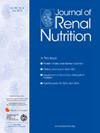50 岁及以上成年人镁摄入量与慢性肾病和肾结石之间的关系:一项具有全国代表性的人群研究的剂量反应分析。
IF 3.2
3区 医学
Q2 NUTRITION & DIETETICS
引用次数: 0
摘要
目的:较高的血清镁浓度与慢性肾脏疾病(CKD)风险的降低有关。然而,在普通人群中,镁摄入量与慢性肾脏病和肾结石之间的剂量反应关系仍然未知。本研究旨在定量评估镁摄入量与慢性肾脏病和肾结石之间的剂量反应关系:方法:纳入 2007-2018 年全国健康与营养调查的成年参与者(≥50 岁)。通过结构化膳食回忆确定膳食和补充剂中的镁摄入量。肾结石患者通过标准问卷进行鉴定。慢性肾功能衰竭的定义是估计肾小球滤过率为 2。采用限制性三次样条对非线性关系进行了分析。并按性别进行了分层分析:结果:慢性肾脏病和肾结石的加权患病率分别为 12.16% 和 13.13%。镁摄入量与慢性肾脏病之间存在非线性关系(非线性P=0.02)。最初,随着镁摄入量的增加,患慢性肾脏病和肾结石的几率会急剧下降,而当镁摄入量超过 350 毫克/天时,患慢性肾脏病和肾结石的几率会出现平台或较弱的下降[患慢性肾脏病的几率比(95% 置信区间):0.60(0.46-0.78),患肾结石的几率比(95% 置信区间):0.77(0.61-0.98)]。在男性和女性中,较高的镁摄入量与患慢性肾脏病的几率成反比,而较高的镁摄入量与患肾结石的几率之间的反比关系仅在女性中具有统计学意义:结论:较高的镁摄入量与较低的肾结石和慢性肾脏病几率呈非线性关系,在 50 岁及以上的成年人中,镁摄入量的临界水平为每天 350 毫克。这些发现值得通过前瞻性队列研究加以证实。本文章由计算机程序翻译,如有差异,请以英文原文为准。
Association Between Magnesium Intake and Chronic Kidney Diseases and Kidney Stones in Adults Aged 50 years and Older: Dose–Response Analysis of a Nationally Representative Population-Based Study
Objectives
Higher serum magnesium concentrations have been linked to reduced risk of chronic kidney diseases (CKDs). However, the dose–response relationships between magnesium intake and CKD and kidney stones in the general population remain unknown. This study aimed to quantitatively assess the dose–response relationships between magnesium intake and CKD and kidney stones.
Methods
Adult participants (≥50 years) from the 2007-2018 National Health and Nutrition Examination Survey were included. Magnesium intake from diet and supplements were determined with structured dietary recalls. Patients with kidney stones were identified using a standard questionnaire. CKD was defined as estimated glomerular filtration rate <60 mL/min/1.73 m2. The nonlinear relationships were explored with restricted cubic splines. Stratified analyses by sex were conducted.
Results
The weighted prevalence of CKD and kidney stones was 12.16% and 13.13%, respectively. A nonlinear relationship between magnesium intake and CKD (Pfor nonlinearity<.01) and kidney stones (Pfor nonlinearity = .02) was found. There was an initial steep decrease in odds of CKD and kidney stones with increasing intakes of magnesium, and then a platform or weaker decrease in odds of CKD and kidney stones was observed beyond 350 mg/day of magnesium intake [odds ratio (95% confidence interval) for CKD: 0.60 (0.46-0.78), 0.77 (0.61-0.98) for kidney stones]. Higher magnesium intake was inversely associated with odds of CKD in both males and females, while the inverse association between higher magnesium intake and odds of kidney stones was only statistically significant in females.
Conclusions
Higher magnesium intake was nonlinearly associated with lower odds of kidney stones and CKD, and a threshold level of 350 mg/day of magnesium intake was observed in adults aged 50 years and older. These findings deserve to be confirmed by prospective cohort studies.
求助全文
通过发布文献求助,成功后即可免费获取论文全文。
去求助
来源期刊

Journal of Renal Nutrition
医学-泌尿学与肾脏学
CiteScore
5.70
自引率
12.50%
发文量
146
审稿时长
6.7 weeks
期刊介绍:
The Journal of Renal Nutrition is devoted exclusively to renal nutrition science and renal dietetics. Its content is appropriate for nutritionists, physicians and researchers working in nephrology. Each issue contains a state-of-the-art review, original research, articles on the clinical management and education of patients, a current literature review, and nutritional analysis of food products that have clinical relevance.
 求助内容:
求助内容: 应助结果提醒方式:
应助结果提醒方式:


